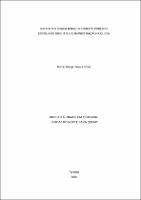Use este identificador para citar ou linkar para este item:
https://repositorio.idp.edu.br//handle/123456789/3356Registro completo de metadados
| Campo DC | Valor | Idioma |
|---|---|---|
| dc.contributor.advisor | Branco, Paulo Gustavo Gonet | - |
| dc.contributor.author | Rocha, Márcio Giorgi Carcará | - |
| dc.date.accessioned | 2021-09-24T14:10:29Z | - |
| dc.date.available | 2021-09-24T14:10:29Z | - |
| dc.date.issued | 2019 | - |
| dc.date.submitted | 2021 | - |
| dc.identifier.citation | ROCHA, Márcio Giorgi Carcará. Direito à cidade em Teresina: lagoas do norte para quem? 2019. 108 f. Dissertação (Mestrado em Direito Constitucional) - Instituto Brasileiro de Ensino, Desenvolvimento e Pesquisa, Brasília, 2021. | pt_BR |
| dc.identifier.uri | https://repositorio.idp.edu.br//handle/123456789/3356 | - |
| dc.description.abstract | A dissertação analisa o direito à cidade em Teresina, a partir do programa Lagoas do Norte, da prefeitura municipal de Teresina, em parceria com o Banco Mundial. Analisou-se, na introdução, o contexto das manifestações mundo afora e no Brasil, nos anos dez do século XXI, verificou-se a evolução das cidades ao longo da história e a respectiva produção do espaço urbano. Posteriormente, analisou-se a produção do espaço urbano em Teresina, especialmente a partir de Henry Lefebvre, principal referencial teórico, desde a emancipação para capital do estado do Piauí, no intuito de compreender, ainda que de modo incipiente, como aquele espaço urbano sempre existiu para prestígio dos detentores do poder político e econômico e segmentação da população - mandada, literalmente, para as margens dos rios Poty e Parnaiba: negros, quilombolas, indígenas, o que deu origem a várias comunidades, entre elas a região conhecida como “Lagoas do Norte”. A partir daí, apresenta-se o programa Lagoas do Norte, da prefeitura municipal de Teresina, em parceria com o Banco Mundial, as remoções forçadas e as lutas dos moradores para ali permanecerem, como uma face própria do direito à cidade. Logo em seguida, apresenta-se o “direito à cidade”, de Henry Lefebvre, com suas diversas acepções, seja em David Harvey, Manuel Castells, Edésio Fernandes, mostrando as eventuais discussões acerca do alcance, sentido e exigibilidade desse direito ainda tão desconhecido, sua previsão nos documentos internacionais e as experiências em países da América Latina, como Colômbia, Argentina, Uruguai, Bolívia para, enfim, analisar as origens e existência de um “direito à cidade” no Brasil e na Constituição Federal, na legislação infraconstitucional, com seus eventuais componentes estruturais. | pt_BR |
| dc.description.abstract | This dissertation seeks to analyze the right to the city in Teresina, based on the Lagoas do Norte program, by the Teresina municipal government in partnership with the World Bank. Analyzing, in the introduction, the context of demonstrations around the world and in Brazil, in the ten years of the 21st century, the evolution of cities throughout history and the respective production of urban space was verified. Subsequently, the production of urban space in Teresina was analyzed, especially from Henry Lefebvre, the main theoretical framework, from the emancipation to the capital of the state of Piauí, verifying, albeit in an incipient way, as that urban space, always existed for to honor the holders of political and economic power and, with this, literally sending to the banks of the Poty and Parnaiba rivers, segments of the population that practiced different sociability: blacks, quilombolas, indigenous people, originating, from there, several communities, among them the region known as “Lagoas do Norte”. From then on, the Lagoas do Norte program, presented by the city of Teresina, is presented, in partnership with the World Bank, analyzing the forced evictions and the struggles of those people to remain there, as an aspect of the right to the city. Soon after, Henry Lefebvre's “right to the city” is presented, with its various meanings, whether in David Harvey, Manuel Castells, Edésio Fernandes, showing the possible discussions about the scope, meaning and demandability of this still-unknown right , its prediction in international documents and the experiences in Latin American countries, such as Colombia, Argentina, Uruguay, Bolivia, to finally analyze the origins and existence of a “right to the city” in Brazil and in the Federal Constitution, in infraconstitutional legislation, with its eventual structural components. | pt_BR |
| dc.language.iso | por | pt_BR |
| dc.rights | Open Access | pt_BR |
| dc.title | Direito à cidade em Teresina: lagoas do norte para quem? | pt_BR |
| dc.type | Tese de mestrado | pt_BR |
| dc.location.country | BRA | pt_BR |
| Aparece nas coleções: | Mestrado Interinstitucional em Direito (Minter) | |
Arquivos associados a este item:
| Arquivo | Descrição | Tamanho | Formato | |
|---|---|---|---|---|
| DISSERTAÇÃO_ MÁRCIO GIORGI CARCARÁ ROCHA_MESTRADO EM DIREITO.pdf | 820.02 kB | Adobe PDF |  Visualizar/Abrir |
Os itens no repositório estão protegidos por copyright, com todos os direitos reservados, salvo quando é indicado o contrário.
